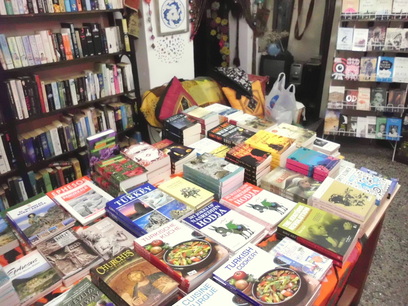Finding your Niche(s)
 Merdiven Bookshop in the Turkish town of Kas.
Merdiven Bookshop in the Turkish town of Kas.
You can have thousands of Facebook and Twitter
followers and still not sell books. Alternatively, you can have a few hundred,
and sell way beyond them. The real question is, not how many followers you
have, but how many genuinely engaged followers you have. This is why finding
which niches your novel appeals to is so crucial, because niches are engaged audiences. And if you like strategy games such as Risk or Chess, it ought to be rather a lark.
There is a prevailing attitude that you need to be pumping out erotica or sci-fi to make money as a self-published author. In fact, there are far too many prevailing attitudes. I've taken something of a stand against them. You can sell anything. Yes anything. And a cursory glance at any supermarket aisle ought to make this abundantly clear.
We have been trained by the current publishing industry to think in terms of a few, very limited genre styles. Fantasy, crime, murder mystery, chick lit. etc. Yet, I'm not convinced, at least for a new author trying to gain visibility, that marketing by genre alone is the best strategy. I found this out, because my novel Ayse's Trail, being contemporary biography meets historical fiction, didn't fit neatly into the classic genre structure we are used to. Instead, I homed in on all the tiny sub-groups of people who might be interested in my novel. Start local, start small, and soon enough the word will get around.
1. How to discover which niches are most appropriate for your novel?
Take the various themes or subthemes in your novel and research online interest groups pertaining to them. The setting and main character of your novel ought to point you in the direction of at least two niche markets who may be interested in your book. Let's say your story is set in Wapping and concerns a thirty-something male software engineer who becomes embroiled in a drug cartel. Your niche markets would include; Wapping, thirty-something men, office workers in the UK, contemporary thriller readers.
2. How to market to those niches?
Don't fall into the trap of assuming you can blanket promote to all parties. Promotion is a lot like romance. You need to court your potential readers, find out what they like, where they hang out, what they read. Strategies that work for one niche, don’t necessarily work with another. If I'd written the above office crime novel, I'd be scouring Wapping for an Indie bookshop, a library, or a book club. I'd offer someone in the local newspaper a free print copy in exchange for a review. I'd leave a couple of copies in strategic local hangouts, perhaps a train station or a newsstand, somewhere with commuters. I could start an office-worker appropriate blog, or easier, I'd research the type of blogs that UK office workers are already reading and offer to guest post, or offer the bloggers a free copy in return for a review. This is where the Twitter hashtag comes into its own. You can hashtag pretty much any subject under the sun and see who's blogging about it, or if there's a related Facebook page.
3. Are some niche markets better than others?
Before exhausting yourself, check how much competition there is for your niche. What you are looking for is a sector with a lot of people or interest groups attached that not many are catering for. With my novel Ayse’s Trail, I avoided marketing it as historical fiction for two reasons; First, it wasn’t only historical fiction and thus could have disappointed those who were looking for pages of corset-ripping historical drama. The second reason was, historical fiction is a massive genre with some heavy-weight competition. I would have struggled for visibility in it.
There is a prevailing attitude that you need to be pumping out erotica or sci-fi to make money as a self-published author. In fact, there are far too many prevailing attitudes. I've taken something of a stand against them. You can sell anything. Yes anything. And a cursory glance at any supermarket aisle ought to make this abundantly clear.
We have been trained by the current publishing industry to think in terms of a few, very limited genre styles. Fantasy, crime, murder mystery, chick lit. etc. Yet, I'm not convinced, at least for a new author trying to gain visibility, that marketing by genre alone is the best strategy. I found this out, because my novel Ayse's Trail, being contemporary biography meets historical fiction, didn't fit neatly into the classic genre structure we are used to. Instead, I homed in on all the tiny sub-groups of people who might be interested in my novel. Start local, start small, and soon enough the word will get around.
1. How to discover which niches are most appropriate for your novel?
Take the various themes or subthemes in your novel and research online interest groups pertaining to them. The setting and main character of your novel ought to point you in the direction of at least two niche markets who may be interested in your book. Let's say your story is set in Wapping and concerns a thirty-something male software engineer who becomes embroiled in a drug cartel. Your niche markets would include; Wapping, thirty-something men, office workers in the UK, contemporary thriller readers.
2. How to market to those niches?
Don't fall into the trap of assuming you can blanket promote to all parties. Promotion is a lot like romance. You need to court your potential readers, find out what they like, where they hang out, what they read. Strategies that work for one niche, don’t necessarily work with another. If I'd written the above office crime novel, I'd be scouring Wapping for an Indie bookshop, a library, or a book club. I'd offer someone in the local newspaper a free print copy in exchange for a review. I'd leave a couple of copies in strategic local hangouts, perhaps a train station or a newsstand, somewhere with commuters. I could start an office-worker appropriate blog, or easier, I'd research the type of blogs that UK office workers are already reading and offer to guest post, or offer the bloggers a free copy in return for a review. This is where the Twitter hashtag comes into its own. You can hashtag pretty much any subject under the sun and see who's blogging about it, or if there's a related Facebook page.
3. Are some niche markets better than others?
Before exhausting yourself, check how much competition there is for your niche. What you are looking for is a sector with a lot of people or interest groups attached that not many are catering for. With my novel Ayse’s Trail, I avoided marketing it as historical fiction for two reasons; First, it wasn’t only historical fiction and thus could have disappointed those who were looking for pages of corset-ripping historical drama. The second reason was, historical fiction is a massive genre with some heavy-weight competition. I would have struggled for visibility in it.
Beachgoers and hikers are two separate groups of people who find out about my novel Ayse's Trail in very different ways.


